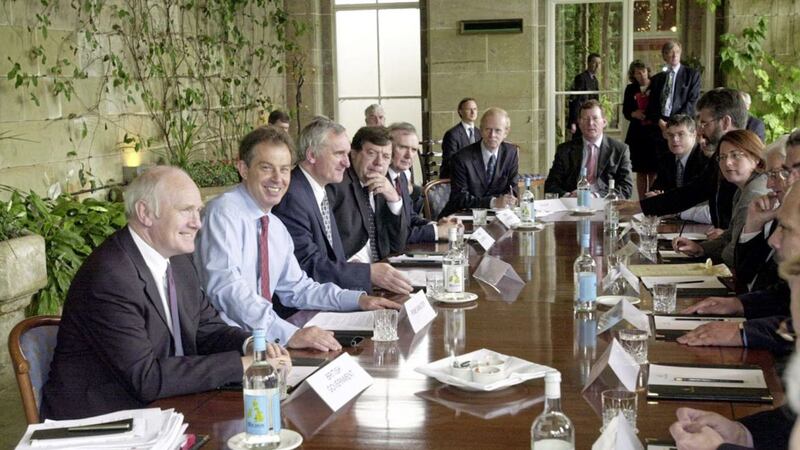We have been heading towards a Troubles amnesty for 20 years, although perhaps not in as sweeping a form as just proposed by Brandon Lewis, the secretary of state.
Negotiations began at the 2001 Weston Park talks, hosted by the British and Irish governments, where a general amnesty was supported or at least accepted by every main party except the SDLP. This was finalised at the 2003 Hillsborough Castle talks, hosted by Tony Blair and Bertie Ahern, then put into a Westminster bill in 2005, which almost made it into law before the SDLP exposed and scuppered it. Since then, Sinn Féin and successive governments have been trying to return to that point while pretending otherwise. All the while, prospects of justice have been eroded by the de facto amnesties of the peace process: the early release scheme, on-the-run letters and royal pardons, immunity for testimony, or simply the passage of time.
It is grotesque this has come to a head with a government blatantly pulling the plug to protect soldiers for narrow electoral reasons. It is barely less grotesque for many parties and other groups here, including the Irish government, to feign outrage. Their cynicism has brought us the worst of both worlds: private agreement to ‘draw a line in the sand’, while still fighting over it in public.
**
For some months, unionists opposed to the Northern Ireland protocol have been excited by a clause in its infamous Article 16 allowing suspension for “diversion of trade”.
Any example of businesses switching suppliers to the Republic has been cited as such a diversion. Although the protocol does not define what ‘diversion of trade’ means, it is usually a technical term in economics referring to tariffs or other barriers forcing importers to pay more or use a less efficient supplier - so spotting a tricolour on cheese in Lidl is not proof it has occurred.
However, that may be about to change. Lord Frost, the UK’s Brexit negotiator, has told a House of Lords committee that booming cross-border trade is “in many ways a problem” as it reflects Northern Ireland businesses having difficulties sourcing from preferred suppliers in Britain. By contrast, the EU says switching to southern suppliers is how much of the protocol should work.
A diversion over diversion is clearly on the cards.
**
The TUV will run candidates in all 18 constituencies at the next assembly election, leader Jim Allister has announced. DUP leader Jeffrey Donaldson replied this will cause a “divided and splintered” unionism and “Sinn Féin will gain at unionism’s expense.”
In reality, unionism should benefit from more competitive parties in a PR-STV election, as it will bring out more voters who transfer down the ballot. The TUV is so hapless at electioneering it could as easily save DUP seats as take them. Of course, neither Allister nor Donaldson can say so.
**
One reason Jeffrey Donaldson is regarded as a reformed character after his anti-agreement days in the UUP is that he has since toured the world promoting the peace process.
Companies House records Donaldson setting up three companies over the past decade to sell peace process expertise abroad. One company, since dissolved, was formed with Ian Paisley jnr. Other co-directors have included figures from Sinn Féin, the SDLP and Alliance.
In 2018, questions were raised about the appropriateness of one of these firms training police officers in Bahrain, due to that country’s human rights record.
Such questions can only increase if Donaldson becomes first minister. For one thing, his ventures compete directly with Northern Ireland Co-Operation Overseas, a non-profit company owned by Invest NI and hence accountable to DUP economy minister Gordon Lyons.
**
The law fixing Northern Ireland’s school starting age is inflexible and unjustified, the High Court has ruled, in a case involving a child born prematurely on the enrolment cut-off date of July 1. There is political support for introducing some kind of deferral mechanism but the bureaucratic resistance is extraordinary. Because all education system metrics are based on pupil age, any blurring of cohorts is viewed as anarchy. Officials would want an exact amount of flexibility to show, so they see it as just creating another cut-off date. Above all, officials fear that if some children can defer then every parent will want it. Heaven forbid that everyone might get what they want.
**
Michelle O’Neill has called for a “rethink” of “our segregated education system”, in what looks like an apology for last week’s attack on integrated schools by Sinn Féin former education minister John O’Dowd.
Writing in the Irish News, the deputy first minister affirmed her support for the New Decade, New Approach review into a single education system, with “children and young people of different backgrounds educated together in the classroom.”
However, O’Neill’s suggestion for advancing this goal is “creating real freedom to choose” by giving equal priority, promotion and investment to all four current sectors: maintained, controlled, integrated and Irish-medium.
This would be a step backwards from the Good Friday Agreement, which creates a statutory duty to encourage and facilitate integrated and Irish-medium education. It also makes no sense: how does investing in multiple sectors move towards a system with all children taught together?









